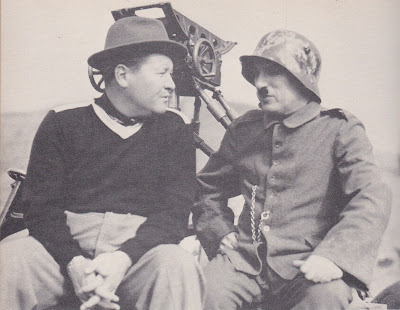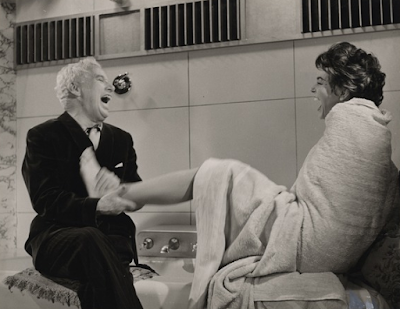This is a new series in which Chaplin's associates describe what it was like to work with "the little genius."1
1Jim Tully recalled that Chaplin was teasingly given this nickname by a few of his associates. (Pictorial Review, 1927).
"Charlie has a mysterious personality, you are always trying to solve him, and you never do. He is almost feminine in his moods and the elusive quality of his personality. One morning he speaks warmly to you. The next he says nothing at all. He is an artist and temperamental.
Now Syd is more masculine. He is a great character actor. He can so change his personality in a scene that I can't recognize him. It is almost uncanny. Where Charlie's pictures are dramas, Syd's are melodramas. The two are exactly opposite, and it is the finest experience in the world working for them." --Charles "Chuck" Reisner, Los Angeles Times, Nov. 21, 1926
 |
| Shooting The Gold Rush. L-R: Harry d'Arrast, Eddie Manson, CC, Rollie Totheroh, and Chuck Reisner. |
"Working with Chaplin convinced me beyond any personal doubt that he is a genius. There's no one in Hollywood like him. In the four months I was in the picture I learned more about acting than I had during all the years I'd put in at it. Without my even realizing it at first, he started right in making me over. In the nine years I'd been carrying that old football for Paramount the one thing hammered into me was speed. Everything I did had to be quick stuff, the fly guy who was too fast for anybody to catch up with him. Chaplin changed all that. He would stop me in a scene and suggest my doing it in another way. At the moment I didn't understand what he was after. But it was clear enough when I saw it on the screen in the projection room. A glance showed me how he got his effects. Then he would say, 'All you have to do, Jack, is to take your time. If, for example, you're soaking a guy over the head with a mallet don't do it bing, bing, bing, but bing — bing — bing. That gives the audience time to laugh between each sock.' His timing is wonderful. --Jack Oakie, Hollywood magazine, August 1940
 |
| With Oakie on the set of The Great Dictator. |
"All members of the cast received equal respect and attention from Chaplin, the director. In Monsieur Verdoux there was a scene with an infant-in-arms so young that, at short intervals, a different baby had to be substituted as the previous one would tire. After one take that he didn't like, Charlie came out from behind the camera, stalked up to the startled infant and scolded, 'You're anticipating again!'" --Robert Lewis, Slings & Arrows: Theater In My Life (I don't think the scene Lewis describes is in the final film.)
 |
| Chaplin as Verdoux and Robert Lewis as Maurice Botello in Monsieur Verdoux. |
"Charlie gave me the biggest compliment I'd ever had. The script said that after listening to [Marlon] Brando's words I was to respond with a look, without saying a word.
'You're like an orchestra answering its conductor,' he said, almost moved. 'If I raise my hands, you go up, if I lower them, you go down....Outstanding.'
From those words, which were sewn inside me, a strong green plant grew, which continues to bear fruits today." --Sophia Loren, Yesterday, Today, Tomorrow: My Life.
| Sophia and Chaplin on the set of A Countess From Hong Kong. |
"Those scenes where we're playing on the street were not done at Mr. Chaplin's studio, they were done on the Paramount lot. And when we shot those scenes there was no music, so my cue was taken from Mr. Chaplin off-camera, giving me the tempo. And if you look, nobody is looking at him except me, because he is directing me on the tempo. And I can see fear in my face because I'm not a musician, but he knew that--he didn't ask me if I knew how to play the violin he didn't ask me if I knew anything about music--he just gave me the tempo. And when the picture was dubbed and the music was laid in, we were watching it in the dubbing room--and I have to tell you, when he was watching himself on screen, Mr. Chaplin never referred to himself as 'I,' he'd always say, 'Did he do that right? Was he funny?' He never said 'Did I do that right.' It was always in the third person. So anyway, we're watching the scene and he's screaming at me on the screen, 'God damn it, play faster, play faster!' And I'm sitting right next to him and he's yelling at the screen. It's because the tempo of the music he had written didn't match the tempo I was playing. I've never forgotten that: he was sitting right next to me and shouting at me on the screen! "--Julian Ludwig interview, Chaplin's Limelight & the Music Hall Tradition, Frank Scheide/Hooman Mehran, ed.
 |
| The street musicians from Limelight. Ludwig is in the middle (watching Chaplin). With Snub Pollard (left) and Loyal Underwood. |
"One of the more curious facets of my job was playing Charlie Chaplin in rehearsals. When a scene had to be set up to Chaplin 's satisfaction he would go behind the camera and call out: 'All right, let's see it!' With the famous battered derby on the top of my head--I stand an even six feet--and with the cane in my hand I would run through the actions of the scene with the other members of the cast. It was no surprise when Chaplin would say 'No, no, no, he wouldn't do that!' and leap in front of the camera to play the scene himself." --Harry Crocker, "A Tribute To Charlie,"Academy Leader, April 1972
 |
| CC and Asst. Dir. Harry Crocker during the filming of City Lights. |
"I thought he was very patient. He never lost his patience with me. But he did with Almira Sessions, the one that played the sister with the bird in her hat. 'Oh, that's him, that's really him, that's the one.' She couldn't get anything straight. He got so frustrated that he started yelling and screaming. 'Why can't you get anything straight? All you have to do is this, this and this,' and that flustered her even more. But other than that, the rest were alright." --Interview with Marilyn Nash, Limelight newsletter, Spring 1997
Lena Couvais (Almira Sessions) recognizes Verdoux in Monsieur Verdoux. "[Charlie is] the easiest man [to work with]. He's never abusive, never impatient. I don't believe anybody else could get out of people what he does. At first they are a little overawed by such a big man. But he soon puts them thoroughly at ease. He always reassures them like this: 'I don't know much more about this than you do. Instead of telling you what to do, perhaps I can show you better.' If the player doesn't respond properly, instead of saying 'No, no, that is wrong!' he very quietly says: 'Maybe I didn't show you right. I will do it again.'" --Henry Bergman, Boston Globe, Feb. 22, 1931
 |
| CC and Henry. |
"There was one scene I could not get right. It was between Charlie and me in my hotel room. Charlie tried to help me "break through," but I just couldn't make it. I don't know whether the fault was mine or the script. But Charlie understood and changed the order of the dialogue.
Shooting that scene took a whole day and afterwards I felt terrible about it. But when I tried to apologize he only laughed. 'Once with Paulette (Goddard) it took four days to get a scene right,' was his only comment." --Dawn Addams, "Leading Lady To A King,"Charlie Chaplin: A Centennial Celebration, Peter Haining, ed.
 |
| Chaplin & Addams in A King in New York. |
"It was funny about City Lights. We began rehearsing that water scene at night. Phew! We did it over and over and things wouldn't feel right. It wasn't until I discovered that Charlie is a southpaw that I realized what was the matter. You may notice I'm left-handed through the picture too--when we shake hands, and during the cigar stunt. Another thing, I've been on the water wagon for years, so I guess I was picked for that role on my past performances. Gosh, the spaghetti and scrambled eggs we consumed rehearsing! But I'll say that for Charlie, he never made me begin before 1 o'clock." --Harry Myers, Los Angeles Times, Mar. 1, 1931
Harry Myers and CC in City Lights. "[Chaplin was receptive to ideas from his associates] but our ideas had to be good and this rarely happened. Chaplin carried the ball all the time, and we were mostly used as punching bags to try ideas on. None of us yessed him, and he always listened to any criticism we might make. Later, as I got to know him better, I discovered the best criticism was silence--and being a very sensitive artist, he knew something was wrong by the expression on our faces." --Harry d'Arrast, "Chaplin's Collaborators,"Films In Review, January 1962
 |
| With Harry d'Arrast |
"I'm the only girl around the studio most of the time, and they treat me like a queen. Everything is always pleasant and harmonious. Mr. Chaplin is very quiet himself and dislikes any unnecessary commotion.
He writes and directs his own pictures and, I tell you, I have to be wide awake and on the alert to keep pace with him, for I never know at what instant he will think up some big scene and, when he is in the mood, he likes to work quickly and steadily. It is always interesting to watch him develop the action, for he insists that there must be a cause leading up to the fights, the runaways, or whatever it is. He acts out our parts for us, and I assure you he can play even my role better than I can, for he is a natural imitator." --Edna Purviance, Motion Picture Classic, November 1919
With Edna during the filming of A Woman Of Paris.
1Jim Tully recalled that Chaplin was teasingly given this nickname by a few of his associates. (Pictorial Review, 1927).


